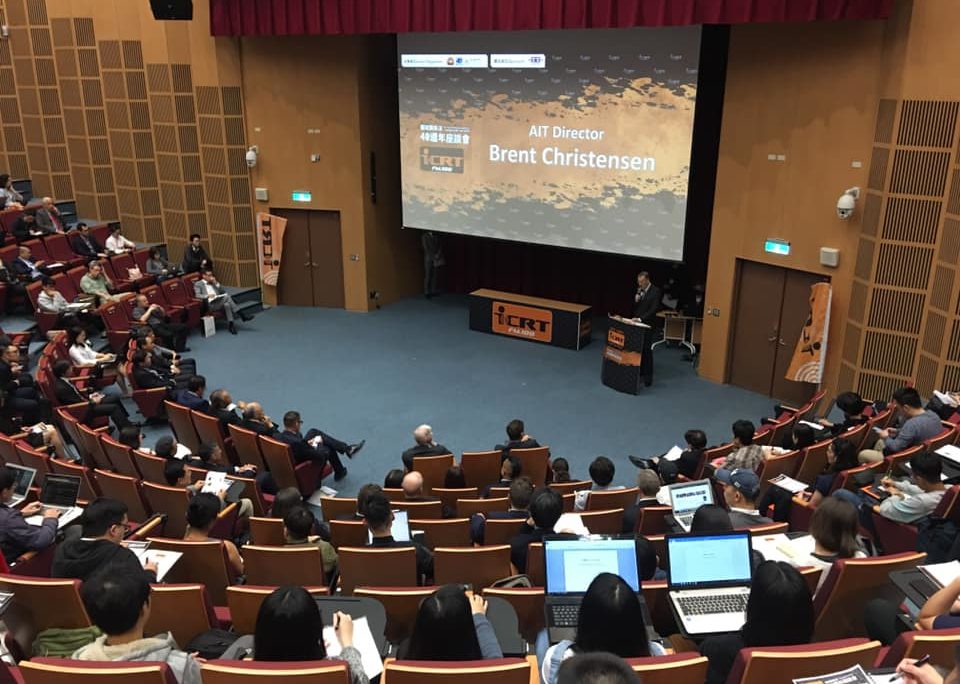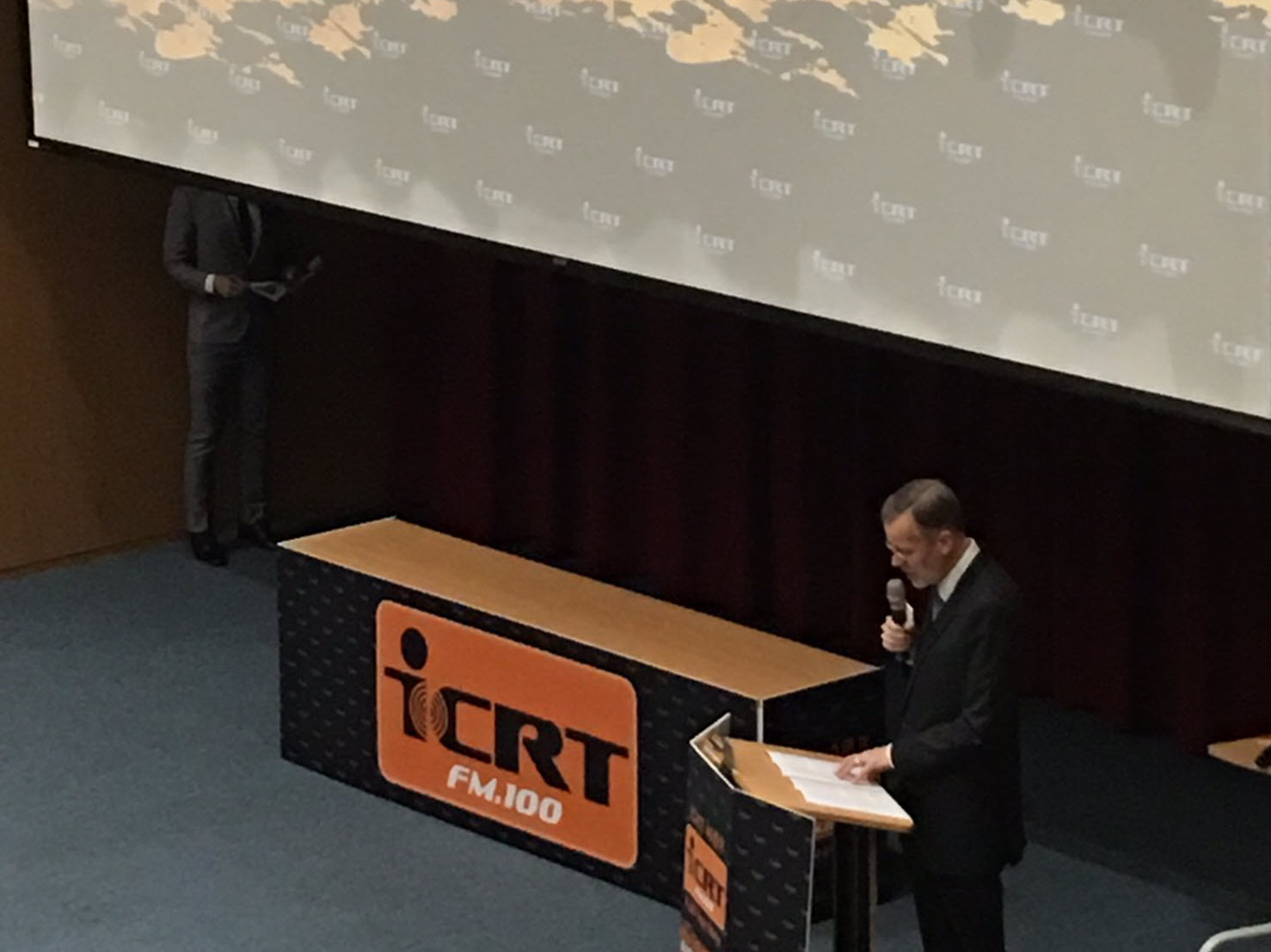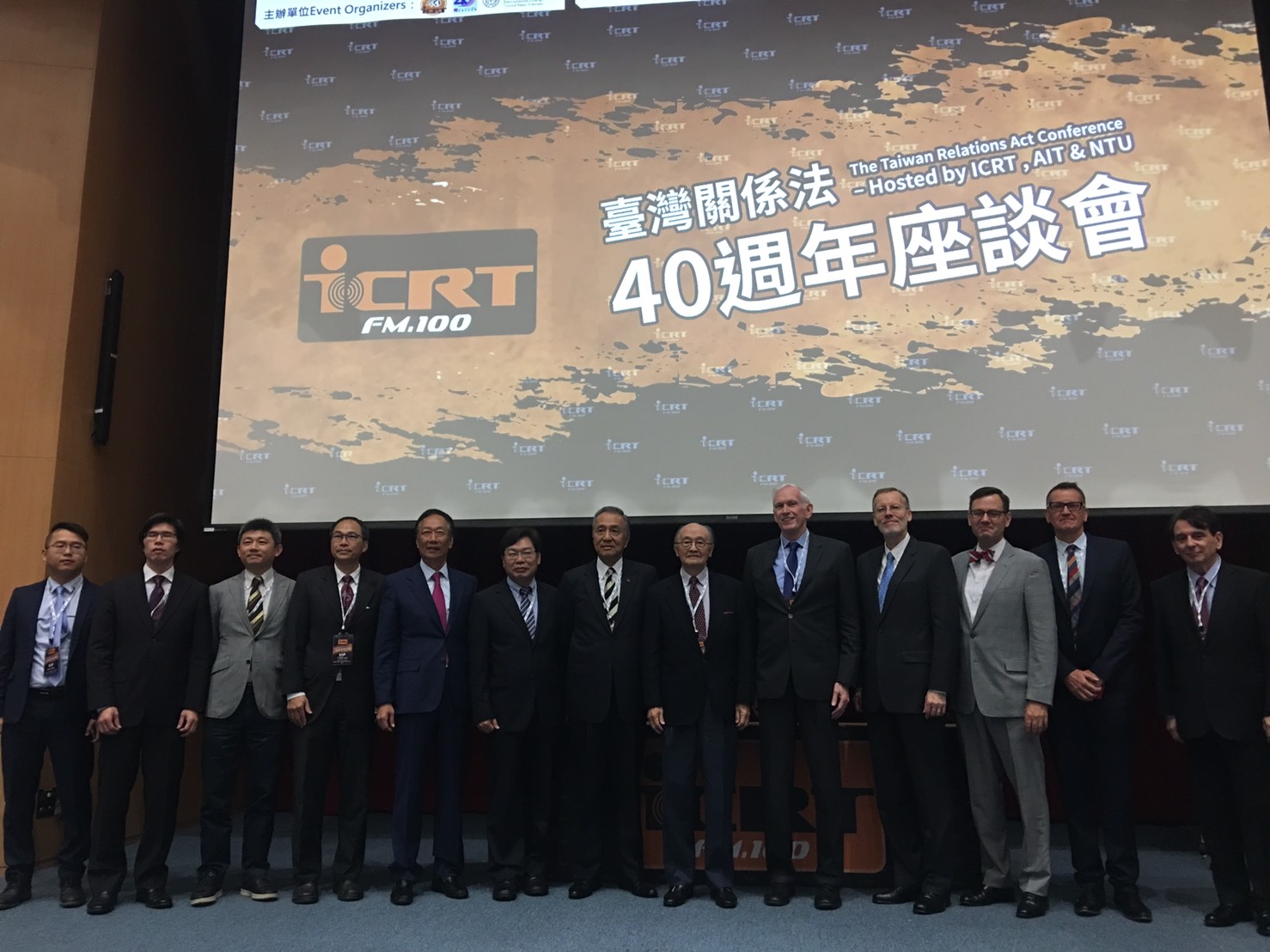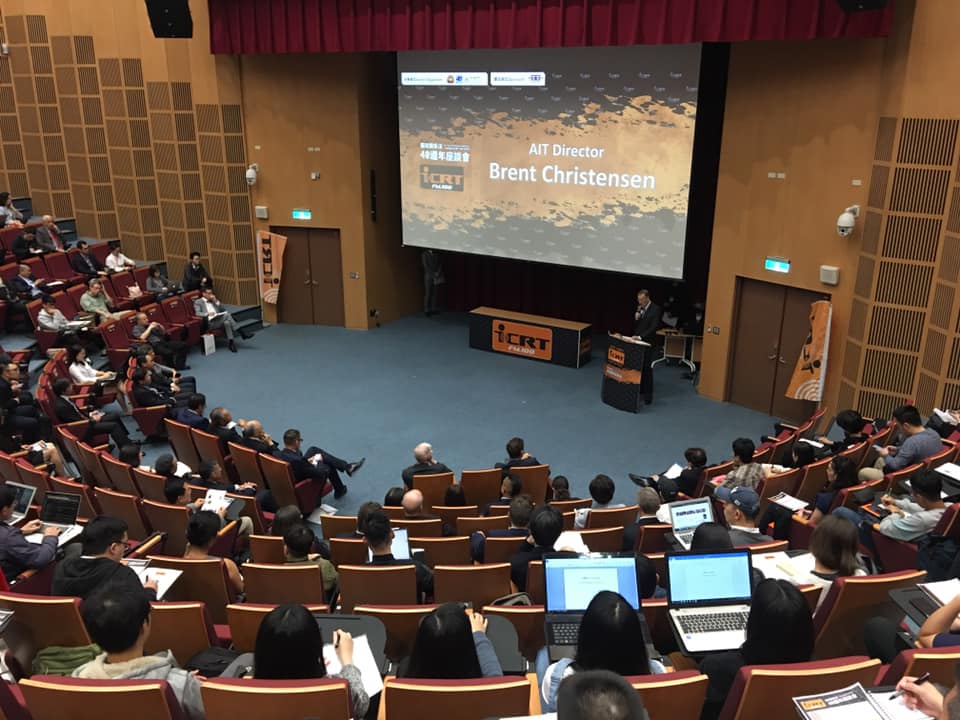AIT Official Text #: OT-1915
April 15, 2019
Remarks by AIT Director W. Brent Christensen
at the conference on
“Taiwan Relations Act @ 40 – Where We’ve Been, and What’s Next?”
April 15, 2019
It is a great honor to be with you here today to mark forty years of friendship and cooperation between the United States and Taiwan. I would like to thank ICRT for organizing this important conference. And also congratulate ICRT for its 40 years of success. I would also like to thank National Taiwan University, particularly former AIT Director Bill Stanton, for hosting this event.
As many of you know, throughout this year AIT will be engaged in a campaign called AIT@40, which marks this anniversary by highlighting U.S.-Taiwan cooperation across a variety of monthly themes. Last month we celebrated our Shared Values, and this month we celebrate Trade & Investment. The truth is, we could continue this campaign for three more years, and still find new areas of U.S.-Taiwan partnership to highlight. That is how rich and truly multi-faceted our relationship is.
Back in 1979 there was broad bipartisan agreement in the United States that although we had suspended formal relations, we still needed to maintain our relationship with Taiwan. We owe Congress a debt of gratitude for having the creativity and the will to write and pass the Taiwan Relations Act, which among other things, authorized the establishment of the American Institute in Taiwan. There is no question that the Taiwan Relations Act has stood the test of time, providing a foundation for the U.S.-Taiwan relationship to grow and develop over the past 40 years.
I have previously said that during my tenure as AIT Director I want to promote four main areas in U.S.-Taiwan cooperation, which I call my “sige zengjin” or “four promotes.” These are: strengthening the U.S.-Taiwan security relationship, strengthening U.S.-Taiwan economic and commercial cooperation, enhancing our people-to-people ties, and finally, broadening the scope for Taiwan to participate on the international stage. Today, as we have all gathered here from around the world to reflect on the importance of the U.S.-Taiwan relationship, I thought it would be especially appropriate to focus on the last of these priorities: expanding Taiwan’s role in the international community. As a democratic role model, a generous donor and a force for good, Taiwan is an exemplary partner for us and for other likeminded countries in addressing the world’s most serious challenges.
Before I speak specifically about Taiwan’s participation on the international stage, let’s take a step back and look at why we need global institutions and cooperation in the first place.
In 1900, France hosted the Exposition Universelle, a world’s fair to celebrate the achievements of the past century and to accelerate development into the next. Over 50 million people visited this exposition. The advanced countries of the world at that time were justifiably proud of the technological progress of the previous century and there was great optimism that mankind was moving into a new age of peace and prosperity in the 20th century. Unfortunately, although the advances of the Industrial Revolution had led to many new peaceful technological developments, it had also introduced new, more efficient and more destructive ways to wage war. Winston Churchill, as a new member of Parliament in 1901 fresh from the Boer War where he had seen some of these new weapons in use, predicted that future war with a modern power would be “a cruel, heartrending, struggle, which must demand, perhaps for years, the whole manhood of the nation and the concentrating of every vital energy.” His words were prophetic but even he could not have foreseen the terrible devastation of World War I, much less the even more horrific destruction of World War II.
Some people recognized that the international order of the early 20th century was part of the problem — lasting peace could not be built on a foundation of fragile alliances and without internationally recognized rules, principles, and dispute resolution mechanisms. So, in the wake of World War I, they sought to address these concerns by establishing the League of Nations. Unfortunately, this organization did not have the authority and support necessary to prevent World War II.
Although it takes people a long time to learn lessons, with the advent of even more deadly weapons, the world realized that if humanity was to survive and prosper, we needed stronger, more binding international institutions, agreements, standards and norms.
The United Nations was created in 1945, and in 1947, the General Agreement on Tariffs and Trade – the precursor to the World Trade Organization – was signed. In 1948, the UN General Assembly adopted the Universal Declaration of Human Rights. Other agreements ensued, including international pacts on reducing weapons of mass destruction and on ensuring the rights of women, children, and minorities. There are hundreds or even thousands more international organizations and regimes that have been established to bind people around the world together.
International organizations and international cooperation are the foundation of this post-World War II international order. Indeed, the most significant challenges we face today are all global in nature – from climate change to global pandemics to preserving the promise of the digital age. Global problems require global solutions, and that means everyone in the global community must come together to tackle these challenges. The international community today is a rich ecosystem of formal and informal institutions and actors, each playing a role in solving global problems. Just as civil society is an indispensable foundation for any vibrant nation, so too is international civil society vital for a peaceful, prosperous, free, and healthy world.
Thus, my main message for you today is simple: Taiwan, as a valuable partner and a force for good in the world, has long been and must continue to be a part of this story.
One of the best examples of this is in the field of public health. Taiwan spends about half of what most developed countries spend on health care per capita, yet it has comparable longevity and other health indicators. Taiwan, which has relatively recently transitioned from a developing to a developed economy, has successfully eradicated diseases like malaria and polio and become a global leader in health care. We want Taiwan to share that experience with the developing world.
And Taiwan has demonstrated the will to share its experience with others. In the Americas, it has established capacity building projects to prevent kidney disease in Belize and St. Kitts and Nevis. In Africa, it has a maternal and infant health care improvement project in eSwatini. In the Pacific region, it has medical cooperation projects in Fiji, Kiribati, the Marshall Islands, Nauru, Palau, Papua New Guinea, the Solomon Islands, and Tuvalu. The United States has seen Taiwan’s willingness to share its knowledge, as we have worked with Taiwan to organize Global Cooperation and Training Framework workshops for countries around the Asia-Pacific region on combating Dengue fever, Zika, Ebola, MERS, and, soon, multi drug-resistant tuberculosis.
Taiwan does not have to spend its government and private sector resources to help others. But it does so willingly and it has so much to contribute. And that is why the entire world – without exception – welcomed Taiwan to participate in the World Health Assembly as an observer from 2009-2016. Then, after a free and fair election in Taiwan, Taiwan was suddenly no longer welcome to attend. As U.S. Secretary of Health and Human Services Alex Azar has pointed out, since health crises do not respect borders, it is difficult to reconcile the global community’s shared concern over cross-border infectious diseases while excluding representatives of the 23 million people of Taiwan.
But this did not deter Taiwan in its efforts to make a contribution. Last year, when the World Health Organization made a worldwide appeal for donations for the Ebola response in the Democratic Republic of Congo, Taiwan pledged one million dollars. But because of China’s objections, WHO rejected Taiwan’s generous offer. Perversely, the WHO, which is on the verge of declaring a Global Emergency over the latest Ebola outbreak in Africa, just recently called again for the international community to step up its donations because it faces a $104 million funding gap to address the outbreak.
What I’ve just described is just one example of what the world misses out on by excluding Taiwan from global problem solving. There are other areas where Taiwan’s exclusion can and does lead to serious consequences.
Take INTERPOL, for instance. China is the lone voice preventing INTERPOL from giving Taiwan access to INTERPOL’s Global Police Communications System and related databases. From January to September 2016 alone, searches of INTERPOL’s databases uncovered more than 110,000 instances of travel documents being used illegally. Nearly 66 million passengers moved through Taiwan in 2017, yet Taiwan did not have access to INTERPOL’s databases on terrorism, trafficking in persons, narcotics and transnational crime. The international community should consider that unacceptable.
The International Civil Aviation Organization is another international safety net with a Taiwan-shaped hole. ICAO’s goal is to achieve a “seamless sky,” where safety standards and counterterrorism measures can be shared with everyone ensuring that the same standards apply wherever we fly. However, Taiwan is excluded from ICAO meetings and does not receive timely notifications of important new findings. In July 2017, for instance, ICAO announced a new security requirement that portable electronic devices with lithium-ion batteries should be turned off and adequately protected before being checked in. Because it is not allowed to attend ICAO technical meetings on security requirements, Taiwan only learned about this requirement at the last minute through the media.
As the United States has stated many times, we support Taiwan’s full membership in international organizations that do not require statehood. In organizations that require statehood for membership, the United States still supports Taiwan’s meaningful participation.
The truth is that most international organizations should be happy to have Taiwan’s participation. Just look at their charters.
INTERPOL’s charter states that it has two aims: “to ensure and promote the widest possible mutual assistance between all criminal police authorities,” and “to establish and develop all institutions likely to contribute effectively to the prevention and suppression of criminal activity.”
The WHO charter states: “The enjoyment of the highest attainable standard of health is one of the fundamental rights of every human being without distinction of race, religion, political belief, economic or social condition… The health of all peoples is fundamental to the attainment of peace and security and is dependent upon the fullest co-operation of individuals and States.”
It should be very clear that these kinds of international organizations are designed to combat the common problems all of humanity faces. But leaving out Taiwan harms the welfare of its 23 million people and it harms the welfare of the rest of the world as well by weakening the international frameworks that have been put in place since World War II to improve cooperation on security, health, safety and a host of other common concerns.
Not only does it violate the spirit of these organizations to exclude Taiwan, it also defies common sense. Let’s return to the World Health Organization. China provides 0.22% of the WHO’s funding. Not 22%, not 2.2%, but two-tenths of one percent of the WHO’s funding, yet it is able to exercise a veto over Taiwan’s observer status in the World Health Assembly as well as in WHO technical meetings.
And even access to United Nations venues. Even though Taiwan is not a UN member, it produces human rights reports every year and invites prominent human rights figures from around the world to critique these reports. It voluntarily complies with UN sanctions regimes, though they are not technically applicable to Taiwan. Yet, someone holding a Taiwan passport is not allowed to enter the United Nations headquarters in New York for any purpose. They cannot even take a tour of the building as a tourist. Stateless people or people from other disputed territories such as the Palestinian territories are allowed to enter. An American with just a driver’s license can enter. Only Taiwan passport holders are barred outright. There are 167 countries that allow Taiwan passport holders to enter visa-free or with visa on arrival – including the United States. That tells you all you need to know about how the world really sees Taiwan. It also highlights how China has been able to manipulate the UN rules to further its own political goals.
Despite the pressure applied by China, Taiwan continues to find ways to contribute. For instance, Taiwan has contributed 32 million dollars in humanitarian aid to help those affected by the destruction caused by ISIS in Iraq and Syria. And Taiwan donated relief supplies just this February to help the desperate people of Venezuela. Taiwan is working to prevent the spread of technologies necessary for the development of weapons of mass destruction; Taiwan is a global leader in promoting women’s economic and political empowerment; it is making steady progress in meeting the UN’s sustainable development goals; and it has become one of the most effective advocates for promoting innovative entrepreneurship around the world. That is what it means to be a good global citizen.
We in the United States will continue to do our part to expand Taiwan’s role on the world stage. We continue to work with other likeminded countries to lobby international organizations to put health, security, and economic prosperity above politics. In 2015, we established the Global Cooperation and Training Framework – or GCTF – which serves as a platform for Taiwan to share its expertise with the world. Over the last four years, we have partnered with Taiwan to sponsor GCTF programs in law enforcement, health, good governance, entrepreneurship, women’s empowerment, bridging the digital divide, cybersecurity, and media literacy, and we intend to increase the frequency and broaden the participation of these programs. We are especially glad to see that Japan signed on as a co-sponsor of our most recent GCTF on combating corruption and of our next GCTF later this week on promoting women’s economic empowerment. We look forward to their continuing contributions.
A few weeks ago, Foreign Minister Wu and I announced a new annual dialogue called the Indo-Pacific Democratic Governance Consultations. This will serve as a regular occasion to increase our cooperation and pursue joint projects in the region that assist other countries in addressing governance challenges. We expect the first round to be held in Taipei later this year and the U.S. delegation will be led by a senior official from the State Department’s Bureau of Democracy, Human Rights, and Labor. We could not ask for a better partner than Taiwan in promoting this important priority in the Indo-Pacific region.
Before I conclude, I would like mention that, in cooperation with Digital Minister Tang’s office, we will be launching a series of four “Digital Dialogues” – one on each of the priority areas I have identified. We want to hear your creative ideas on how to move the U.S.-Taiwan relationship forward. The dialogues will take place on-line and will harness both artificial intelligence and the wisdom of the crowd. We hope these dialogues will provide a way for people in the United States and Taiwan to play a role in shaping the future of our relationship. I invite you all to participate in these dialogues.
The first dialogue, which begins today, will be on the topic of my presentation today – namely how we can we work together to expand Taiwan’s engagement with the global community. To participate in the dialogues, please go to the AIT website and search for “Digital Dialogues.”
In closing, allow me to emphasize that the United States remains committed to supporting Taiwan in its efforts to play a more active role in the international community as a responsible global citizen. That’s what we are doing, and we call on countries around the world to join us in doing more. I believe that when people of good will come together in support of a good cause, they will ultimately prevail.
Thank you.
















![Video Thumbnail [Recovered]-01](../wp-content/uploads/sites/269/Video-Thumbnail-Recovered-01-1-750x450.jpg)








